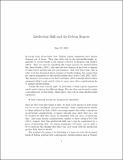Files in this item
Intellectual skill and the Rylean regress
Item metadata
| dc.contributor.author | Weatherson, Brian James | |
| dc.date.accessioned | 2018-07-27T23:34:13Z | |
| dc.date.available | 2018-07-27T23:34:13Z | |
| dc.date.issued | 2017-04-01 | |
| dc.identifier | 244241564 | |
| dc.identifier | c9e72c95-1bb3-40ce-9f47-4198062e3b2c | |
| dc.identifier | 85047346742 | |
| dc.identifier.citation | Weatherson , B J 2017 , ' Intellectual skill and the Rylean regress ' , The Philosophical Quarterly , vol. 67 , no. 267 , pp. 370-386 . https://doi.org/10.1093/pq/pqw051 | en |
| dc.identifier.issn | 0031-8094 | |
| dc.identifier.uri | https://hdl.handle.net/10023/15726 | |
| dc.description.abstract | Intelligent activity requires the use of various intellectual skills. While these skills are connected to knowledge, they should not be identified with knowledge. There are realistic examples where the skills in question come apart from knowledge. That is, there are realistic cases of knowledge without skill, and of skill without knowledge. Whether a person is intelligent depends, in part, on whether they have these skills. Whether a particular action is intelligent depends, in part, on whether it was produced by an exercise of skill. These claims promote a picture of intelligence that is in tension with a strongly intellectualist picture, though they are not in tension with a number of prominent claims recently made by intellectualists. | |
| dc.format.extent | 91159 | |
| dc.language.iso | eng | |
| dc.relation.ispartof | The Philosophical Quarterly | en |
| dc.subject | B Philosophy (General) | en |
| dc.subject | T-NDAS | en |
| dc.subject.lcc | B1 | en |
| dc.title | Intellectual skill and the Rylean regress | en |
| dc.type | Journal article | en |
| dc.contributor.institution | University of St Andrews. School of Philosophical, Anthropological and Film Studies | en |
| dc.contributor.institution | University of St Andrews. Philosophy | en |
| dc.identifier.doi | 10.1093/pq/pqw051 | |
| dc.description.status | Peer reviewed | en |
| dc.date.embargoedUntil | 2018-07-27 |
This item appears in the following Collection(s)
Items in the St Andrews Research Repository are protected by copyright, with all rights reserved, unless otherwise indicated.

